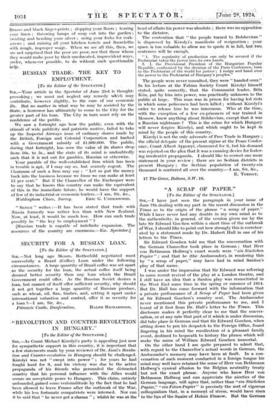• " REVOLUTION AND COUNTER-REVOLUTION IN HUNGARY."
[To the Editor of the SPECTATOR.] Sin,—As Count Michael Karolyi's party is appealing, just now for sympathetic support in this country, it is important that a few statements made by your reviewer of Dr. Jaszi's Revolu- tion and Counter-revolution in Hungary should be challenged. Karolyi was not " swept into power " ; for years he had fought hard for it, and his victory was due to the active propaganda of his friends who persuaded the distracted country that his personal influence with the Allies would secure an acceptable peace to Hungary. This claim, entirely unfounded, gained some verisimilitude by the fact that he had been allowed to leave France after the outbreak of the War, while his less fortunate compatriots were interned. Nor can it be said that " he never got a chance " ; whilst he was at the
head of affairs ,his power was absolute ; there was no opposition to the dictator.
The contention .that •" the people turned to. Bolshevism" is disproved by Karolyi's manifesto of resignation ; your
space: is. too valuable, to allow me to .quote it in full, but two
sentences will be enough. .
" 1. The regularity of production can only be secured if the
Proletariat takes the power into its own hands. .
2. I, the Provisional President of the Hungarian Popular Republic,',confronted by the decision of 'the Paris Conference, turn to the Proletariat of"the world for justice.; I resign and hand over the power to the Proletariat of Hungary's peoples."
The people were never consulted, they were " handed over." In his lecture at the Fabian -Society Count Karolyi himself
stated, quite correctly, that the Communist leader, -Bela Kan, put by him into power, was practically unknown to the public at large. This man was in prison for having led riots in which some policemen had been killed ; without Karolyi's order to release him he was innocuous. Who at the time, with the exception of a few ex-prisoners of .war trained in Moscow, knew anything about Bolshevism, except that it was a Russian nightmare ? This is the crime for which Hungary will never forgive Kitrolyi, and which ought to be kept in mind by the people of this *country.
Karolyi is not the only advocate of Free Trade in-Hungary;
the official delegate of the present regime at the Peace Confer- ence, Count Albert Apponyi, clamoured for it, but his demand was rejected on the plea that it was a cunning device for foster- ing irredentist propaganda. I should like to correct one more statement in your review ; there are no Serbian districts in present Hungary ; the Serbian population of twenty-six
thousand is scattered all over the country.—I am, Sir, &c., 17 The Grove, Boltons, S.W .10. E. TORBAY.














































 Previous page
Previous page